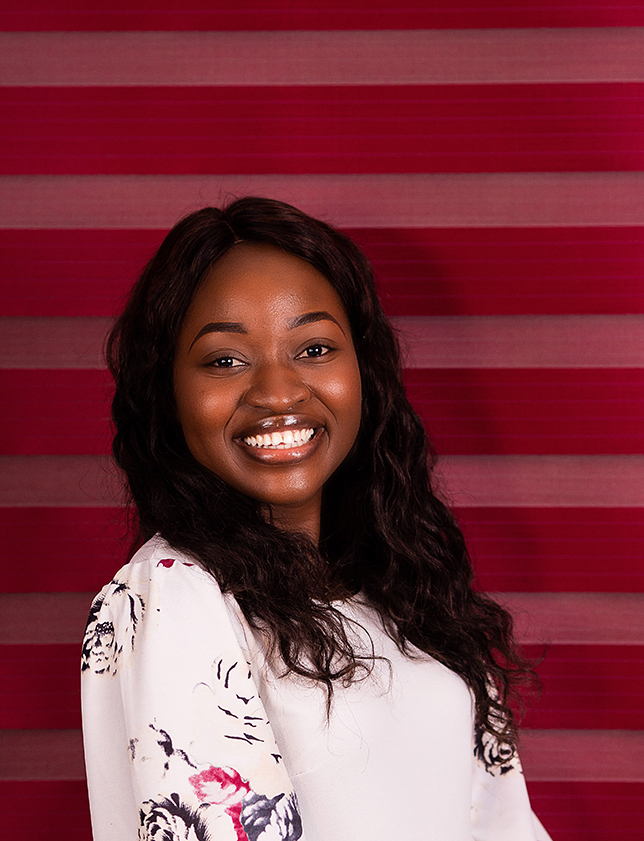
Oluwayomi Akinfenwa is a native of Erin-Ijesha in Osun State, Nigeria. She is currently a PhD student in Data Science with a research interest in Data Visualisation of Bayesian Modelling for Panel and Multi-level data at Hamilton Institute of Maynooth University, Ireland, a fully funded scholarship by Science Foundation Ireland in collaboration with Skillnet. She received her Master’s degree in Mathematical Sciences with Distinction from the African Institute for Mathematical Sciences, Ghana (AIMS-Ghana) in 2021 and a Bachelor’s degree in Statistics from the University of Ilorin, Ilorin, Nigeria, with First Class Honours in 2018.
Oluwayomi Akinfenwa has won several awards, and she was recently recognised by Maynooth University, Ireland as an International Scholar for 2021/2022 Academic session. A recognition award for her unparalleled role in community development services and her advocacy for sexual purity among the girl-child was awareded to her in 2021 by Morris Roussel Premium Awards. She was also recognised for her outstanding academic performance and ability to communicate Science and Mathematics in a layman’s language during her Master’s degree with F.K.A. Allotey Meritorious Award by AIMS-Ghana. Oluwayomi has been privileged to take up leadership positions in various spheres of influence, and she has demonstrated captaincy to the best of her ability with mind-blowing results.
Her transition to Maynooth University for a Doctoral degree in Data Science was birthed from her passion to improve the quality of life with innovations, analysis, and inferences made from Clinical dataset. As an advocate for Sustainable Development Goal 3- Good Health and Well-being, she desires to use the knowledge garnered as a Data Scientist to analyse Clinical data and provide valid inferences that will validate the decision making of the Public Health sector in Africa and beyond.
Her study at AIMS-Ghana was an eye-opener to ethics for conducting an excellent research that bridges the gaps between academia and industry. Prior to her study at AIMS-Ghana, she had a basic understanding of R programming and no prior knowledge of the Python programming language, the lecturers alongside the tutors taught her these programming languages. AIMS-Ghana prepared her academically and professionally as a researcher and science communicator with training on how best to engage quality conversations among peers, tutors and renowned professors. These have played out in her presentations and group works as a research student in her current research institute.
The virtues and research skills acquired from AIMS-Ghana contributed to her greatest achievement as she was able to secure a scholarship worth 300,000 euros with the Science Foundation Ireland (SFI), Centre for Research Training in Foundations of Data Science as a resident researcher in Data Science with Hamilton Institute in Maynooth University, Ireland. AIMS Alumni network contributed to this achievement by giving her access to available and relevant PhD opportunities through the Alumni global online platform for disseminating scholarship and funding opportunities named “AIMS-Chat”. Her vocal deliveries, science communication skills which have been trained at AIMS-Ghana through frequent group presentations and personal projects, paved the way during her interview to secure this offer. Her current research area is Data Visualisation of Bayesian Modelling for Panel and Multi-level data. Producing demographic and global health indicators estimates can often rely on limited spatial and/or temporal data. Making comparisons between different hierarchical models can be difficult due to the large number of choices that can be made during model development regarding data models, process models and hierarchical structures. As a result, the intuition for what the models are doing and what the parameters are capturing is often lacking when it comes to an understanding how information is “pooled”. Appropriate visualisations of key modelling components and parameters can aid model understanding, interpretation and choices of model appropriate in each context. This research aims to develop visualisations for some Bayesian Hierarchical models for modelling demographic and global health indicators that will help the public health sector to gain a deeper intuition for a model’s capabilities and the best means for information utilisation of model parameters and processes, which would improve efficacy, efficiency, and responsiveness in health sector decision making.
